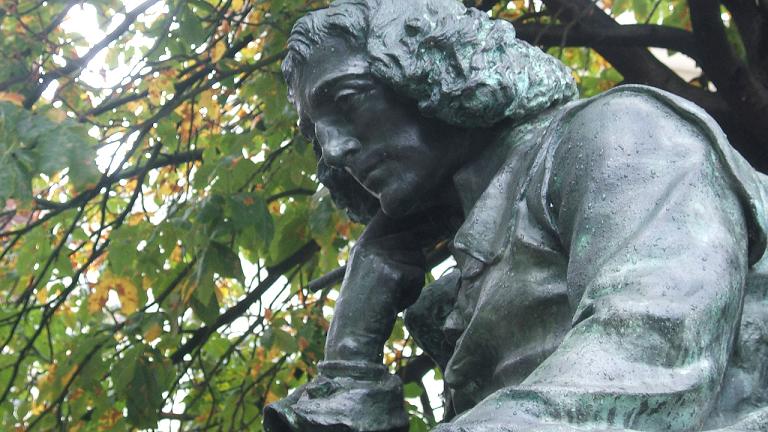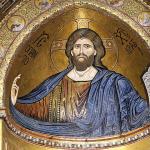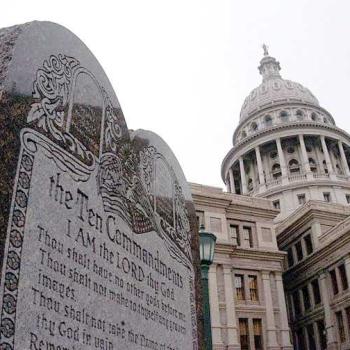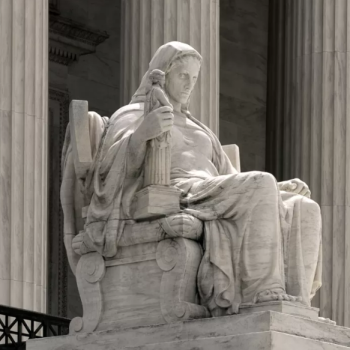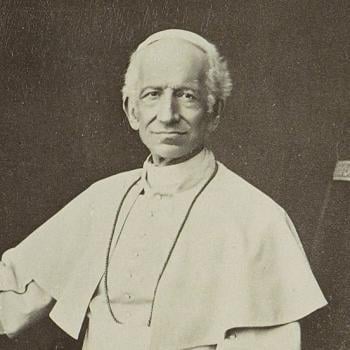Theoretical physicist Albert Einstein (1879 – 1955) often was asked if he believed in God. His usual answer was that he believed in Spinoza’s God. “I believe in Spinoza’s God who reveals himself in the orderly harmony of what exists, not in a God who concerns himself with fates and actions of human beings,” the physicist once wrote in a letter. In an article he wrote in 1930 titled “Religion and Science,” Einstein mentioned Spinoza three times as an example of someone with the highest “religious feeling.”
Einstein became the personification of genius in popular culture. Perhaps for that reason, many religious people fervently want to think he believed in God. But Einstein was a tad coy on the subject. He sometimes denied being an atheist, but he was hardly a believer in any conventional sense. “I have repeatedly said that in my opinion the idea of a personal god is a childlike one,” he wrote. “You may call me an agnostic, but I do not share the crusading spirit of the professional atheist whose fervor is mostly due to a painful act of liberation from the fetters of religious indoctrination received in youth. I prefer an attitude of humility corresponding to the weakness of our intellectual understanding of nature and of our own being.”
Albert Einstein is no longer among us to explain his thoughts. Perhaps the best way to understand his ideas about God is to look to Spinoza.
Baruch Spinoza and Spinoza’s God
Baruch Spinoza (1632 – 1677) is considered today to be one of the most important philosophers of the early modern period. But he was not always held in such high regard. He was a Sephardic Jew whose ideas drew condemnation from rabbis and whose books were banned by the Catholic Church. As recently as the 19th century, to be called a “Spinozist” was an insult in many intellectual circles.
Spinoza was born into a Portuguese-Jewish family in Amsterdam. He may have been a star pupil at the community’s Torah school, but while still a teenager he left school and went to work in his family’s importing business. At the age of 24 he was issued the harshest herem, or ban, ever pronounced by the Sephardic community of Amsterdam. We do not know precisely why. We can only assume he was already expressing some of the views Albert Einstein came to admire centuries later. But he was no longer part of the Jewish community, and he did not convert to Christianity. In 17th century Europe that made Spinoza a genuine outsider. Perhaps being an outsider gave him the fearless independence of thought for which he is admired today.
I cannot even begin to explain the breadth of his ideas in a few paragraphs. Here I will try just to simply explain Spinoza’s most basic ideas about God that caught the attention of Albert Einstein.
Attributes of Spinoza’s God
Spinoza is often called a pantheist, or someone who believes that the universe itself is God. However, it’s not quite that simple. He did not think of God and the phenomenal universe — let’s say “nature” — as exactly the same thing. Instead, he thought that God and nature are two aspects of a single reality. Put another way, everything that exists is an aspect of God. Instead of a vast supernatural being who governs the universe, Spinoza’s God is the infinite and self-caused substance of the universe. Whether that view is or isn’t pantheism depends on how one defines pantheism, and I’ll spare you that analysis.
Spinoza’s God does not perform “miracles” or cause supernatural things to happen to intervene in human events. Instead, “divine providence is identical with the course of nature,” Spinoza wrote. Nature has a fixed and eternal order that no power can change. Spinoza thought that belief in miracles was vulgar and ignorant, not proof of God’s power. God is revealed not through miracles but through nature. This part of Spinoza’s thought definitely turns up in the writing of Einstein the theoretical physicist.
Spinoza rejected anthropomorphism, or giving God human characteristics. Spinoza’s God does not have opinions. Nor does God grant requests sent through prayer. God does not reward or punish. God is entirely impersonal. Some might argue that this God is so far removed from how God is normally understood that it is no God at all. But Spinoza didn’t see it that way. He thought the ideal human life was one devoted to the love of God. The way to “blessedness,” Spinoza wrote, was to cultivate an expansive, intuitive understanding of God. And, I have to say, love of God who is an aspect of nature does appeal to me. Instead of relating to nature as something to exploit for its resources — a strategy that is killing our planet — what if we all treated nature, and each other, as an aspect of God?
Einstein and Spinoza
In The New Yorker (“Reading Into Albert Einstein’s God Letter,” December 25, 2018), Louis Menand wrote that Einstein “regarded organized religion as a superstition, but he believed that, by means of scientific inquiry, a person might gain an insight into the exquisite rationality of the world’s structure, and he called this experience ‘cosmic religion.’” This cosmic religion is not about sin and redemption. Instead, it is about what is. It is about the awesome and inexorable laws of the universe, of the infinite interaction of time and space. And it is about how there is something instead of nothing. Reflecting on this should fill us with awe and a profound religious feeling. Einstein wrote in 1930,
The religious geniuses of all ages have been distinguished by this kind of religious feeling, which knows no dogma and no God conceived in man’s image; so that there can be no church whose central teachings are based on it. Hence it is precisely among the heretics of every age that we find men who were filled with this highest kind of religious feeling and were in many cases regarded by their contemporaries as atheists, sometimes also as saints. Looked at in this light, men like Democritus, Francis of Assisi, and Spinoza are closely akin to one another.
How can cosmic religious feeling be communicated from one person to another, if it can give rise to no definite notion of a God and no theology? In my view, it is the most important function of art and science to awaken this feeling and keep it alive in those who are receptive to it.
Baruch Spinoza explained his ideas in far more depth and detail than I have just hinted at here, so I hope you don’t dismiss them outright. And I can’t say that he and Albert Einstein would have agreed in every detail. But the religious views of these two geniuses of separate centuries were certainly very close.
